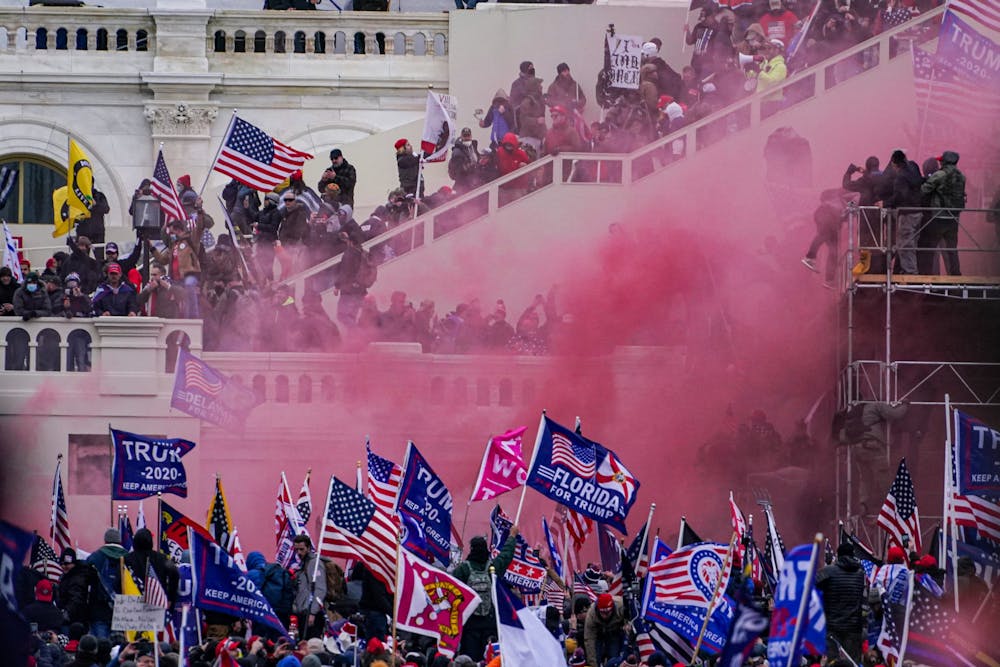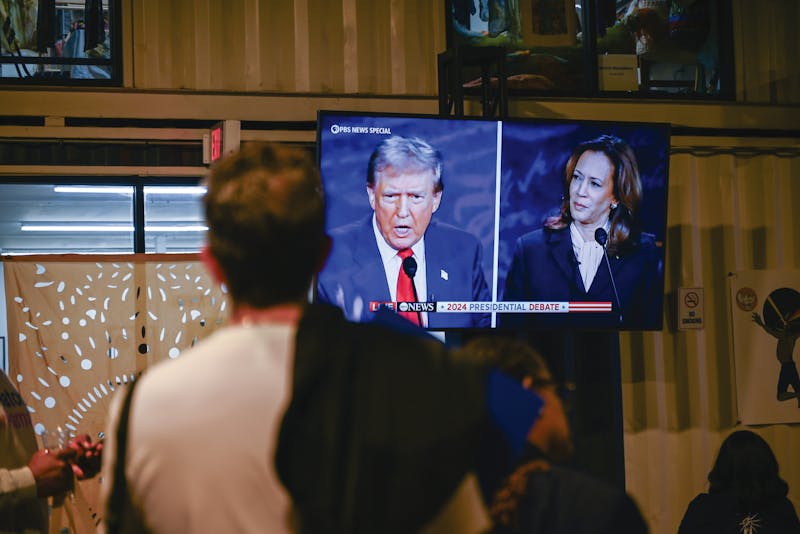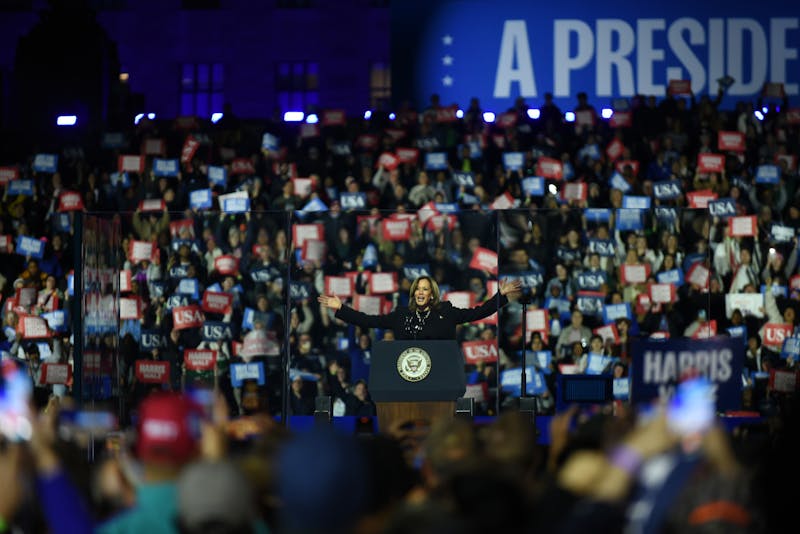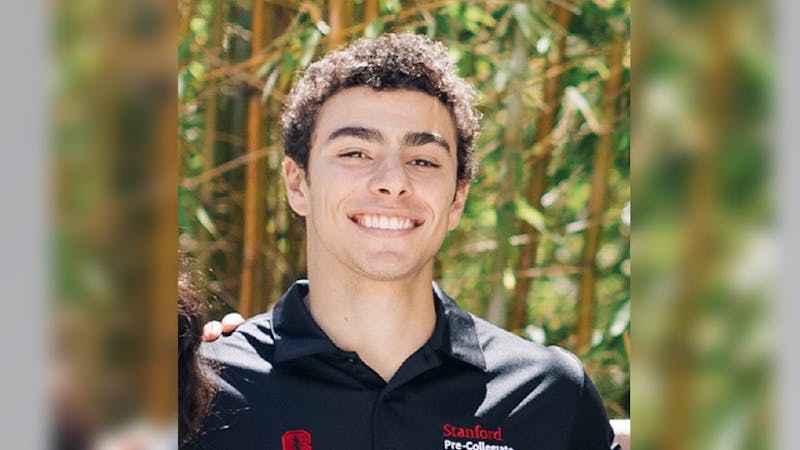
President and 1968 Wharton graduate Donald Trump unconditionally pardoned 2010 College graduate Patrick Stedman on Jan. 21.
Credit: Chase Sutton2010 College graduate Patrick Stedman, who was convicted of five offenses for his involvement in the Jan. 6, 2021 riot at the Capitol, received an unconditional pardon from President Donald Trump on Monday.
Stedman is one of 1,500 people — including some convicted of assaulting police officers — included in sweeping pardons issued shortly after the 1968 Wharton graduate returned to the White House. According to a press release by the United States Attorney’s Office for the District of Columbia at the time of his sentencing, Stedman was part of a “disorderly mob” during the riot, overran police lines, and entered the chambers of then-House of Representatives Speaker Nancy Pelosi (D-Calif.).
The press release also stated that Stedman took “selfie photos of himself on the Speaker’s Balcony” and shouted threats at police officers.
“After he was expelled from the Capitol building by police, Stedman recorded a video for his followers, explaining that he had ‘taken action’ to prevent Congress from certifying the results of the presidential election and that the ‘rats’ – as he referred to members of Congress – had "scurried into the tunnels" to escape. He posted on social media that ‘patriots’ had stolen the hard drives from the Capitol and, ‘The Storm is Here,’” the press release said.
“I was pretty much in the first wave, and we broke down the doors and climbed up the back part of the Capitol building and got all the way into the chambers,” Stedman said in a video shortly after departing the Capitol.
Stedman, who has frequently petitioned Trump on social media to pardon individuals involved in the riot, shared his gratitude to the president for the clemency in several posts on X. He did not respond to a request for comment from The Daily Pennsylvanian.
“It’s almost four years to the day, and a few hours from now four years ago I was arrested by Biden’s DOJ, and so I spent one year behind bars and three years under various release conditions, and it’s all over now,” Stedman said in a video posted to his X account.
In the announcement of the pardons, Trump described the prosecution of individuals involved in the riot as a “grave national injustice that has been perpetrated upon the American people over the last four years.”
The Federal Bureau of Investigation arrested Stedman in his hometown of Haddonfield, New Jersey on Jan. 21, 2021, 15 days after the Capitol riot. He was later convicted of a felony count for obstruction of an official proceeding and four misdemeanor counts: entering and remaining in a restricted building or grounds, disorderly and disruptive conduct in a restricted building or grounds, disorderly conduct in a Capitol building, and parading, demonstrating or picketing inside a Capitol building.
While Stedman was sentenced to four years in prison, a September 2024 victory on appeal vacated his felony conviction and returned the charge to the trial court. The Department of Justice and Stedman later reached an agreement in which the felony charge would not be retried, provided Stedman refrained from appealing his misdemeanor convictions.
As a result, Stedman was released from custody on Oct. 27, 2024 after one year behind bars.
Stedman, a social media influencer, describes himself in his biography on X as a “J6 Political Prisoner” and a “Dating + Relationship Coach … Helping men who want healthy relationships to attract & keep their dream girl.” In the October 2024 ruling vacating Stedman’s felony conviction, United States District Judge Beryl Howell noted that Stedman urged his followers to come to Washington, D.C. on Jan. 6, 2021, and told them that “This is the second American Revolution.”
Howell, while finding that Stedman was not a flight risk or danger to his community, described concerns over his continued spreading of misinformation as “sufficiently legitimate and serious.”
Stedman “may spew this nonsense to retain, attract and grow his online following to make money and increase his popularity, or this may reflect his actual beliefs,” Howell wrote.
At Penn, Stedman double majored in History and Political Science and earned a minor in Modern Middle Eastern Studies. He also listed involvement with the Penn Debate Society and Penn Political Review in the MyPenn alumni database.
The pardons come four years after the riot — which marked a historic challenge to the center of American democracy — bringing to a halt extensive efforts by federal investigators to hold its organizers accountable. As part of the proclamation, Trump also ordered the Attorney General to cease prosecution of approximately 450 remaining cases related to the riot.
Trump, throughout his presidential campaign and in recent months, frequently sought to downplay the violent nature of the Capitol riot — instead recasting it as a “day of love.”
Those released as a result of the clemency included two far-right leaders who had heavy involvements in orchestrating the riot, Enrique Tarrio of the Proud Boys and Stewart Rhodes of the Oath Keepers militia. Tarrio and Rhodes were respectively sentenced to 22-year and 18-year prison terms for seditious conspiracy.
Monday's pardons have prompted bipartisan criticism. Several Republican senators denounced Trump’s decision, particularly highlighting the pardoning of individuals convicted of violent crimes, including assaulting police officers. Democrats who criticized the pardon included Pennsylvania Gov. Josh Shapiro, who said that the pardoning “offends sensibilities of me and most Americans.”
Trump was personally charged by the Justice Department in August 2023 with four counts related to his efforts to overturn the results of the 2020 election: conspiracy to defraud the United States; conspiracy to obstruct an official proceeding; obstruction of and attempt to obstruct an official proceeding and conspiracy against the right to vote and have one’s vote counted.
The case did not reach trial, however, and Special Counsel Jack Smith dropped the ongoing investigation after Trump’s victory in the election. In a recent report sent by Smith to Attorney General Merrick Garland after the conclusion of the investigation, Smith defended his team’s work and said that the evidence against Trump was sufficient to receive a conviction at trial if not for his return to power.
The Daily Pennsylvanian is an independent, student-run newspaper. Please consider making a donation to support the coverage that shapes the University. Your generosity ensures a future of strong journalism at Penn.
Donate










